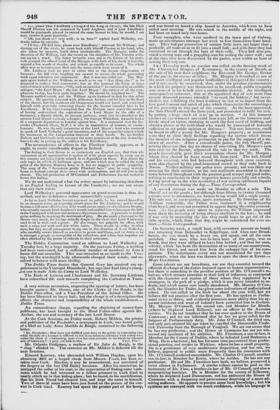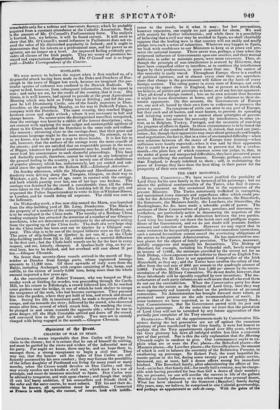A very serious accusation, respecting the opening of letters, has
been brought against Mr. Heron, one of the Clerks of the Roads, in the Dublin Post-office, and a Vice-President of the Inland Office. He has been liberated on heavy bail ; but the charge is of a description that affects the character and responsibility of the whole establishment.— Dublin Times.
An extraordinary charge, regarding the obtaining of money from publicans, has been brought in the Head Police-office against Mr. Archer, the son and secretary of the late Lord Mayor.
At the Cork Sessions, on Friday week, Robert Milikin' the printer and publisher of the Freeholder, a newspaper in Cork, was found guilty of a libel on Lady Anna Matilda de Burgh, contained in the following letter.
"Mr. Freeholder—How have you fulfilled your duty to the 'addle iu restraining vice, while the lady of a baronet is suffered to riot in an infamous intimacy with a chap who, under the cloak of relationship, puts even her own servants to the blush by repeated acts of indecency ?-1 pray you look to this. PAUL Palo Mr. Orlando Bridgman, a nephew of Sir John de Burgh, is the " chap " alluded to. The sentence on Mr. Milikin is deferred till the next Sessions.
Edward Kearney, who absconded with William Haydon, upon his :obtaining 900/. on a forged check from Messrs. Praed, has been re- taken near Cork. Haydon, it may be' remembered, was convicted of the forgery at the last Old Bailey Sessions. After his conviction, he unripped the collar of his coat, in the expectation of finding some L ank- notes which he had intrusted to a fellow prisoner in Cork Gaol to neatly stitch up in that hiding-place ; but be found, to his mortification, that his Irish friend had cheated him, and kept the notes to himself. Two of these .5/. notes have been just found on the person of the con- -viet in Cork Gata. Kearney bad spent the greater part of his booty,
and was found on board a ship bound to America, which was to have . sailed next morning. He was seized in the middle of the night, and had been on board only two hours.
Four smugglers, who were confined in. the town gaol of Galway, made an adVenturous attempt last week to free themselVes from -bond- age. They had got possession of various little saws, not larger than a penknife, all made so as to fit into a small haft ; and with these they, had contrived to cut through the bars of their cells. They bad also pro- vided a strong rope and a grappling-iron for scaling the outer wall ; and at the time they were discovered by the gaoler, were within an hour of sawing their way out.
J a t Thursday week, an auction was called on the farming stock of Mr. Christopher Morgan, of Kentstown, in the county of Meath, at the suit. Obis next door neighbour, the Reverend Mr. George, Rector of the parish, for arrears of tithes. Mr. Morgan is described as one of the most intelligent and popular landholders in this part of the country; and it may easily be conceived, that, under the peculiar circumstances ill which his property MIS. threatened to be sacrificed, public sympathy was aroused in his behalf over a considerable district. An intelligent correspondent estimates, that at the appointed day of sale more than twenty thousand persons attended " to mark the bidders ;" but never- theless, not exhibiting the least tendency to riot or to depart from the free good-humour and spirit of joke which iffiaracterize the assemblages of the peasantry in this part of the country. At the hour appointed, the Sub-Sheriff entered the farm-yard, and proceeded to fulfil his task, by putting a large stack of cern up to auction. " At this moment (writes an eye-witness) one could hear a pin fall, as the immense mul- titude stood on tiptoe, straining to catch the first word of bidding, and obtain a glance at the individual who would lee possessed of temerity sufficient to • set public opinion at defiance." Not one, however, could be found to offer a penny for Mr. Morgan's property; so unanimous were they to show their feelings regarding the system which forces the mern'oer of one religious persuasion to pay for the support of a mi- nister of another. After a considerable pause, the Sub- Sheriff, per- ceiving. there was that day no chance of converting Mr. Morgan's corn into cash for the Rector, adjourned the sale to that day week. The people immediately gave three tremendous cheers for Mr. Alorgair; whom they chaired by force round his farm-yard. The Sub-Sheriff
and his assistant, who had behaved throughout with great courtesy, were also cheered by the good-humoured crowd as they rode back to
Navin. Neither military nor police were present; nor was- there any
occasion for their services, as the vast multitude assembled in Kents- town behaved throughout with the greatest good temper and good order,
retiring in conclusion to their respective homes peacefully and soberly, lnoving acted up to the wise resolution cf not tasting spirituous liquors of any description during the day.— Times Correspondent.
A second attempt was made on Monday to effect a sale. The Sheriff set up the goods ; but although from fifteen to twenty thousand persons were in attendance, no human being would bid a single penny. The sale was, in col-sequence, again postponed. By direction of Sir William Somerville, the Police were stationed in a neighbouring churchyard, and were not permitted to appear during the entire proceed- hips. As the people were about to separate, Sir William impressed upon them the necessity of being always obedient to the laws : he said it was may by respecting the law they could hope to get rid of the tithe system, which, from that day, might be considered for ever ex- fillet—Globe Correspondent.
On Saturday week, a small boat, with seventeen persons. on board, was returning from Belinullet to Kilgalligan, and when near Broad- haven, she was struck by a heavy sea, and upset, and all the crew perished. One man, who was to have been of the party, was so drunk, that they were obliged to leave him behind ; and thus for once, whisky, which has been the destruction of so many of our countrymen, stood his friend, and saved him from the unhappy fate of his com- panions. The unfortunate event was not ascertained for two days- afterwards, when the boat was thrown in upon the shore at Enver.— Mayo Constitution.
Great talents are not hereditary, nor are they essential- toward the efficient discharge of the duties imposed upon an honest representative; but there is something in the peculiar position of Mr. O'Connell's re- latives, which attracts attention to their lack of influence, as contrasted with the character aid station of those whom they supplanted by-a stratagem, in the garb of a pledge, which it was never intended to re- deem, and which seems now totally abandoned. Mr: Maurice O'Con- nell, the Member for Tralee, has given some indications of undisciplined talent. He was called to the Irish bar about the year lE-27, but we believe did not practice after the first year. He has spoken in Parlia- ment twice or thrice, and evidently possesses more ability than his ap- parent indolence and want of industry have permitted him to disclose. Mr. Morgan O'Connell, the second son, and Member for Meath, (where he displaced Lord Killeen), was an officer in the Austrian service. We do not recollect that he has ever spoken in the House of Commons ; and we are informed that be has no great relish for the fatigues of Parliamentary duty. Mr. John O'Connell, the third son, had only just attained his age when be expelled the Honourable Frede- rick Ponsonby from the Borough of Yougball. We are not aware that he has any profession ; and the House of Commons has not yet wit- nessed any specimen of his abilities. Mr. Fitzsimon, a son-in-law, is Member for the County of Dublin, where he defeated Lord Brabazon, a Whig. He is a barrister ; but has for some time pastretired from profes- sional practice, and resides in Wicklow, where he has a small property.- He is a gentleman of very unobtrusive disposition, and has not, we- believe, appeared in public more frequently than his connexion with. Mr. O'Connell rendered unavoidable. Mr. Charles O'Connell, another son-in-law, is Member for Kerry, where he resides. He has not any profession. He and Mr. Fitzsimon have both, we believe, preserved a strict silence in Parliament. A similar tribute cannot be paid to the taciturnity of Mr. Finn, a brother-in-law of Mr. O'Connell, and also.a nonpractising barrister. He is Member for the county of Kilkenny, where he displaced Lord Duncannon, • and has addressed the House of Commons with a frequency and perseverance deserving of a more ad- miring audience. He appears to possess some local knowledge ; but his opinions are conveyed with too much confidence, while his language is remarkable only for a tedious and inaccurate fluency, which be probably acquired from a constant attendance at the Catholic Association. Such is the amount of Mr. O'Connell's Parliamentary force. The analysis is hurried, but, we believe, it will be found correct. It will serve to show that Mr. O'Connell's moral influence in Parliament does not ex- ceed the value of his diminished popularity in Ireland ; and it ought to demonstrate that his talents as a professional man, and his power as an agitator, are no longer on a level. An improved feeling evidently per- vades all classes of the Irish people. They are weary of promises be- trayed and expectations disappointed. The O'Connell rent is no longer paid.—Dublin Correspondence of the Courier.



















 Previous page
Previous page